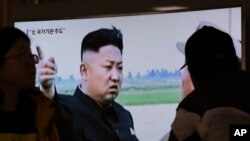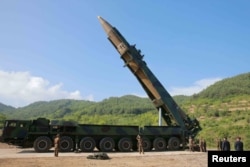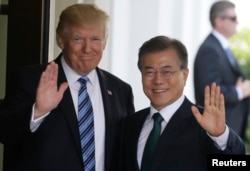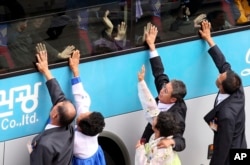With South Korea's offer to hold military talks with North Korea already putting the U.S. on edge, experts say Seoul's move risks further fraying relations with Washington rather than significantly advancing relations between the two Koreas.
In a bid to calm rising border tensions on the Korean Peninsula and ultimately to dismantle North Korea's nuclear weapons program, Seoul on Monday proposed holding military talks and separate Red Cross talks with Pyongyang later this week at the heavily guarded border village of Panmunjom. This is the first formal overture to the North under President Moon Jae-in, who was inaugurated in May.
As Seoul looked to engage the Kim Jong Un regime, the Trump administration quickly signaled its discomfort, indicating that current conditions remain insufficient to have dialogue with Pyongyang, which has yet to respond to South Korea's invitation.
"I think the president has made clear in the past ... that any type of conditions that would have to be met are clearly far away from where we are now," White House Press Secretary Sean Spicer told a media briefing on Monday.
There is a divergence of opinion between Washington and Seoul as to how to rein in the North's expanding nuclear weapons program, with President Donald Trump bent on restraining the Kim regime through sanctions and Moon preferring dialog and engagement.
"The U.S. is unlikely to come out against Moon's overtures, but Moon's overtures to Pyongyang will deepen the mistrust and push the U.S closer to cooperating with Japan on North Korea policy," said Sung-Yoon Lee, a professor of Korean studies at the Fletcher School of Law and Diplomacy at Tufts University.
Best-case scenario
Should North Korea respond positively to the proposal, the talks, in the best case, may result in agreements to cease propaganda broadcasts across the border and reopen the military-to-military hotline between Seoul and Pyongyang, which was cut last year after a nuclear test by the North. These and other steps would improve communications and reduce the risk of military clashes between the two sides, according to David Straub, a former State Department Korea expert who is currently at the Sejong Institute in Seoul.
"Genuine dialogue could reduce miscommunications and misunderstanding," Straub told VOA's Korean Service.
Christopher Hill, who served as the head of the U.S. delegation to the six-party talks, which stalled in 2008 during the George W. Bush administration, thinks a dialog between the two Koreas aimed at reducing tensions on their border is something the U.S. should not discourage.
"I think it's important for the Koreans to work these things out without the help of the Americans," said Hill, who was also the U.S. ambassador to South Korea. "The U.S. approach is in the security realm, especially on the nuclear weapons issue, so I don't think it's for the U.S. to be advising the South Koreans on peninsula talks."
'Always a danger'
Although there might be moves to reduce the risks of miscalculation, many analysts think the timing for talks is less than opportune, given that North Korea conducted what it called a successful test of a long-range intercontinental ballistic missile earlier this month. Many recognized the test as significant progress in meeting Pyongyang's goal of striking the U.S. with a nuclear weapon.
Jonathan Pollack, a senior fellow at the Brookings Institution, said South Korea must be "realistic about [talks] rather than make wildly optimistic conclusions about what the possibilities might be."
"There's always a danger in being too far forward-leaning toward North Korea, because it's entirely possible that North Korea will see that as a sign of weakness," Pollack said.
Troubled by the signs of dialogue and inter-Korean contact coming out of the Moon administration, Tufts University's Lee described the recent initiative as "one-sided, capitulatory diplomacy" by Seoul, "aimed at getting the Kim regime to cease provocations and creating the illusion of peace and reconciliation."
"Heavily chaperoned separated-family reunions are one such measure of success in inter-Korean relations," said Lee. "In 2010, North Korea used military talks and talks on reopening Mount Kumgang tours as a smokescreen for the sinking of the [South Korean naval vessel] Cheonan and the shelling of Yeonpyeong Island." Pyongyang was blamed for both incidents despite its denials.
Past failures
Further clouding the chance of talks are South Korea's past failures to engage the regime, said Bruce Klingner, a former CIA deputy division chief for Korea, who is now with the Heritage Foundation.
"So you wonder how more effective Moon's entreaties will be than all of the other previous South Korean efforts at engagement with North Korea," Klingner said. "And indeed, since Moon was inaugurated, North Korea has shown it's going to act just as badly toward him as to [former Korean presidents] Park Geun-hye and Lee Myung-bak, just as it showed it would act just as badly" toward U.S. leaders during the administrations of former presidents Barack Obama and George W. Bush.
At this point, Lee said, the Kim regime likely will try to raise the stakes with yet another provocation — a nuclear or ICBM test — before accepting Seoul's offer to talk. The tactic could be used to extract concessions, he added, such as an agreement to avoid criticism of the Kim regime by the South, more government contacts and subsequent financial aid, a halt to U.S.-South Korean combined military exercises, and most importantly, a graduated downgrading of the U.S.-South Korea alliance.
Pollack of the Brookings Institution said North Korea may be expected to toe a tough, uncompromising line.
"The goal that North Korea has here is less improved inter-Korean relations per se," he told VOA. "Their real goal, I think, would be, to the extent possible, to delink [South Korea] from the alliance with the United States."
What is to be avoided, Pollack added, "Is the situation where it appears as if South Korea and the United States are taking steps that seem to be in contradiction to one another."











